#caribbean history
Text
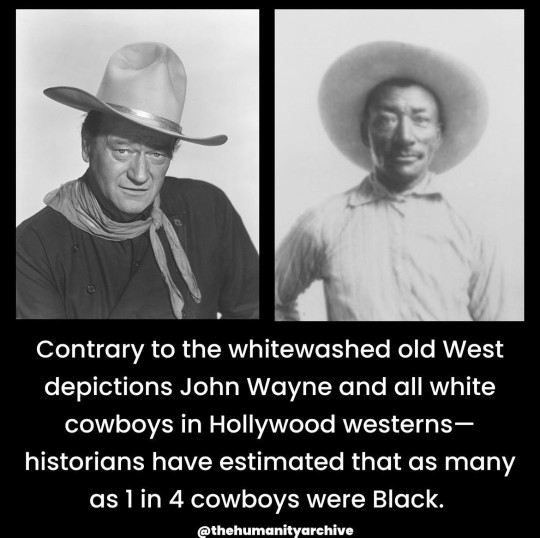
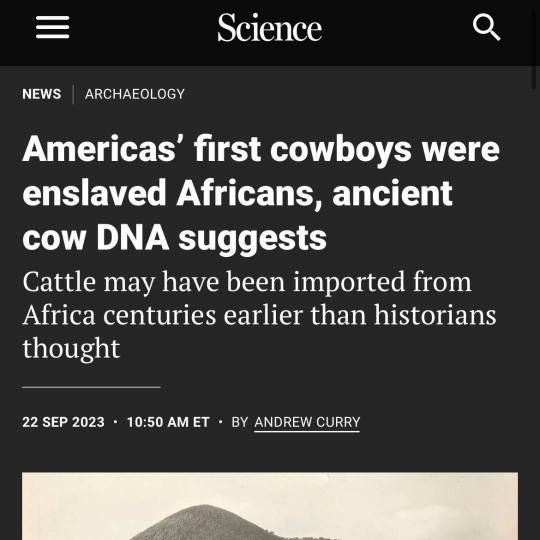
"...the first cowboys lived in Mexico and the Caribbean, and most of them were Black.
That’s the conclusion of a recent analysis of DNA from 400-year-old cow bones excavated on the island of Hispaniola and at sites in Mexico. The work, published in Scientific Reports, also provides evidence that African cattle made it to the Americas at least a century earlier than historians realized.
The timing of these African imports—to the early 1600s—suggests the growth of cattle herds may have been connected to the slave trade, says study author Nicolas Delsol, an archaeozoologist at the Florida Museum of Natural History. “It changes the whole perspective on the mythical figure of the cowboy, which has been whitewashed over the 20th century.”
x
#cowboys#african heritage#caribbean history#mexican history#dna analysis#historical perspective#slave trade#cattle herds#cultural reevaluation#17th century#black cowboys#early americas#black history
308 notes
·
View notes
Text
WAKE UP ITS HAMILTON TIME (hamilton pt 1)
everyone thank richard for getting me to put all my knowledge about alexander hamilton in one place. if you're at all new or confused, @thereallvrb0y once asked me 3 years ago to tell him everything about every historical figure i can, and since then i have been doing that. now we are onto the last one on the list he gave me, and studying hamilton is literally my life's work, so here it is. on tumblr.com. for free.
my sources for this are Ron Chernow and Hamilton himself and a strange amalgamation of knowledge from different museums, documentaries, interviews with historians, and other otherwise publicly accessible knowledge that i have compiled into the vast library inside my mind! you can find my notes in the link in my pinned post. let's go (this historical research is sponsored by the ghost of freddie mercury and my aunt who made me a whole pot of coffee)
Background Information
Ron Chernow loves to talk about how the island of St. Kitts and Nevis was formed, but that's not fucking important. What's important about Hamilton's birthplace is that it was positioned in the Caribbean in such a way that made it a very easily accessible port, however the coastline was pretty smooth which made it generally unideal for mooring ships.
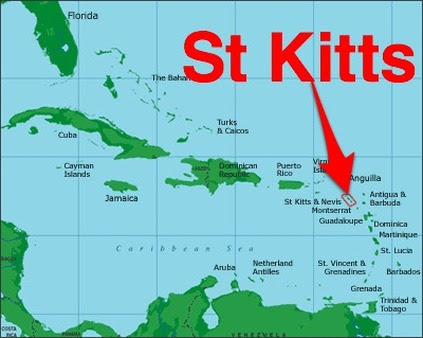
Source: The St. Kitts' Scenic Railway; Six Frigates: The Epic History of the Founding of the US Navy by Ian W. Toll, p. 112 ("Basseterre Roads was not a good natural harbor. It was little more than a dent in the otherwise smooth coastline that ran along the western side of the island. There was no pier- visitors were obliged to run their boats directly onto the beach, sometimes surfing in on waves that broke heavily as they reached the shore.")
Now, notice that St. Kitts and Nevis is, in geographic terms, to the right-ish of the Caribbean. That means when you're coming from Jolly Ole England, you might make a pit stop in St. Kitts and Nevis. So if you ignore the fact that the island has no natural harbor (at least not a good one), it might be a good economic prospect for a young merchant, right?
Well, not if that merchant is James Hamilton, because he was an idiot. And I say that lovingly, or at least more lovingly than Ron Chernow did. Ron Chernow also emphasized that St. Kitts and Nevis was filled with the 18th century version of Shameless, and also Jewish people. Ron Chernow might not hate Jewish people, but he does hate the character archetypes in Shameless. In Shameless terms, James Hamilton was like Frank Gallagher.
Disclaimer: knowledge of Shameless is not necessary to understand that being compared to a guy named Frank is not a good thing
I've already made posts about Hamilton's parents and brother (here, if you'd like to read that ig. weirdo), but I want to talk about the things that Hamilton would have learned from his parents. Later in life, Hamilton vaguely alluded to his father's failings in business being due to an excessive amount of generosity and not really understanding where he should and shouldn't spend his money. This did not by any means make Hamilton stingy with his money, or even smart, for that matter, but it did make him want to be something specific: independent.
James Hamilton's tragic flaw was his dependence on other people, whether it was his older brother or Rachel Faucette or his business partners, etc. Due to the position and order in which he was born, James was never destined to be a leader. He wasn't exceptional academically like other non-first-born-sons, such as James Madison, or dispositionally inclined to organize and inspire, like George Washington. He was just a dude, and he was a dude who was not built for 18th century society, especially not in the Caribbean. From what we can tell, James Hamilton was a gullible, moderately intelligent man with symptoms of autism and non-descript mental health issues. He was basically fucked from the get-go.
Source: Alexander Hamilton by Ron Chernow (p. 12-16); Papers of Alexander Hamilton, vol. 25, p. 89, letter to William Jackson, August 26, 1800 ("In a capacity of a merchant he went to St. Kitts, where from too generous and too easy a temper he failed in business and at length fell into indigent circumstances.")
Rachel Faucette was like James Hamilton's polar opposite. She was forced to learn how to provide for herself, not being able to rely on anyone, because that could be ripped out from under her feet at any moment, and the only thing concrete in her life was herself. She was a woman, and that was what most women had to learn at some point.
Rachel was also perfectly poised to be the clear moral guide for young Hamilton. When James Hamilton left, he basically sacrificed any reverence his son might have for him, and instituted Rachel as Hamilton's sole role model for his developmental years and i just burned the shit out of my hand with coffee.
Disclaimer: James Hamilton had nothing to do with me burning the shit out of my hand with coffee, I promise. You can't blame all your problems on deadbeat dads
If you're a Sigmund Freud fan, (good opener, I know), you're aware of the Oedipus Complex, and that's not exactly what I'm talking about, but yk. look it up. This theory proposed by Freud was only partially rejected by the psychological field (due to the fact that not everything is about wanting to fuck your mom and kill your dad, and also that's not the story of Oedipus Rex like. at all??), but the part that still rang true was that children do have a unique attachment to the opposite sex parent.
Psychological studies show that children tend to describe their opposite sex parents more favorably than same sex parents. Why? I don't know, I'm not a psychologist, I'm an 18 year old who drinks coffee like he was 5 kids to raise.
Source: "The Relation between Attachment to Opposite Sex Parents and Attachment to Romantic Partners" by Gary L. Grogan and Dr. Mary E. Pritchard, p. 10 ("However, most significant for the present inquiry were the findings that respondents described their opposite sex parents more favorably, and same sex parents more critically.")
This statistic is visible in Hamilton's descriptions of his parents, and must have been enhanced by James Hamilton's early departure in his son's life, the consequences from that which seemed constant, but also by the reputation his father had built on the island he left Hamilton on. Hamilton would grow up to see his mother not only providing for herself and her children, but also overcoming the consequences of James' actions, which provoked resentment towards his father, and admiration towards his mother. This will develop as a theme throughout his life, but we'll touch on that as he grows up. He isn't even born yet! So let's get on to that.
Source: so when I say Hamilton's description of his mother, I really mean HIS son's, but JCH most likely got this description from his father, Life of Alexander Hamilton by John Church Hamilton, vol. 1, pg. 42 ("...a woman of superior intellect, elevated sentiment, and unusual grace of person and manner. To her he was indebted for his genius."); for the sake of my reliability and reputation, I'll include JCH's description of his grandfather for comparison, Intimate Life of Alexander Hamilton by John Church Hamilton, p. 13 ("Hamilton's father does not appear to have been successful in any pursuit, but in many ways was a great deal of a dreamer, and something of a student, whose chief happiness seemed to be in the society of his beautiful and talented wife, who was in every way intellectually his superior.")
Early Life
Alexander Hamilton was born ginger on January 11, 1755, and I don't entertain the argument that he was born in 1757 because I'm not an anarchist and I believe society has laws (I'm actually lying, I'll talk about the birth year debate in the college section). Hamilton was not, however, born black or Jewish. He was also, potentially, born not James Hamilton's son.
"Wh- WHAT?! *cries*" I hear you say, and I know, it's shocking information, but yes. First off, Hamilton was not black in any percentage more than the Pillsbury dough boy is black. This theory comes from the fact that Rachel Faucette was a lower class woman and therefore we have no proof that she WASN'T partially black. I don't even have to dispute that for anyone with a gram of critical thinking skills to see that that isn't a valid historical hypothesis.
The Jewish thing has a little more merit to it, and there's a whole book about it that I haven't read. There is some evidence to suggest that Rachel Faucette's ex husband, Johann Lavien, could have been a secret Jewish person, and possibly caused Rachel herself to convert, and she tried to pass on that to Hamilton by having a Jewish woman educate him when he was a toddler (that last part is a true fact, and is the earliest piece of information we have about Hamilton's education). If this is true, (and it's nearly impossible to prove true or false because well if Lavien was a secret Jew, it was a secret), it did not impact Hamilton's religious beliefs in any way, and he identified as a Christian throughout his entire life.
We'll do a paternity test on Hamilton later, just hang tight. See, this is how I get you, I say something controversial, and then I don't talk about it until 16 paragraphs later.
Source: Alexander Hamilton by Ron Chernow, p. 9 ("A persistent mythology in the Caribbean asserts that Rachel was partly black, making Alexander Hamilton a quadroon or an octoroon. In this obsessively race-conscious society, however, Rachel was invariably listed among the whites on local tax rolls. Her identification as someone of mixed race has no basis in verifiable fact. (See pages 734-35 [this is in Chernow's Acknowledgments, and he just talks about how he used a paper trail to come to this conclusion, and thought genetic research would only confuse the evidence. He also discusses that there is a small chance that Hamilton fathered a black child named William Hamilton, but I can go ahead and tell you that's false due to the fact that Hamilton had just arrived in America when William was born -HWS]) The folklore that Hamilton was mulatto probably arose from the incontestable truth that many, if not most, illegitimate children in the West Indies bore mixed blood."); Life of Alexander Hamilton by John Church Hamilton, vol. 1, p. 42 ("...rarely as he alluded to his personal history, he mentioned with a smile his having been taught to repeat the Decalogue in Hebrew, at the school of a Jewess, when so small that he was placed standing by her side upon a table); Ibid., vol. 7, p. 710-11; Papers of Alexander Hamilton, vol. 26, p. 774, "Comments on Jews"
Hamilton's education began with his mother, who is almost definitely the person who made him fluent in French by the time he came to America. Despite limited access to books (34 books in both French and English to be specific), Hamilton still studied everything he could from a young age, with an early love for learning new things and proving that he was smarter than you. However, most of his education was in the School of Hard Knocks Community College, which was amply provided by the environment around him.
In the height of the British Empire, the Caribbean was essentially a social prison for anyone who broke the moral laws of the colonial, Eurocentric society of the time. This included pirates, prostitutes, drunks, thieves, and basically anyone who didn't fit the mold for a member of high society and/or someone who could serve high society and their lives of luxury. Hamilton, by birth, was one of these people.
Hamilton's father moved the family to St. Croix right before he left, which was a dramatic shift from Hamilton's life on St. Kitts and Nevis. In St. Croix, everyone knew Hamilton's mother as the disgraced ex-wife of Johann Lavien, and therefore knew her two sons as "whore-children", which was a word usually given to illegitimate children. Here, Hamilton was roped in with the degenerates of society, and it was practically said directly to him that he was destined to be unholy, unclean, worthless, and disgusting. Could you believe that this would have an impact on his mental health?
Along with seeing the poor lifestyles of the inhabitants of the Caribbean, Hamilton also saw glimpses into a very different world: ~rich people~. There were few rich white people on the islands, and they owned vast amounts of enslaved people, with the black to white ratio being 8:1 in the Caribbean. These enslaved people were forced to live in horrible conditions, and Hamilton saw it everywhere- his mother owned three people, but they were often rented out to garner profit for the white family, rather than working a plantation as others in the Caribbean did. Violence towards enslaved black people was only part of the violence young Hamilton witnessed in the Caribbean, some of which came in the form of dueling *insert ominous music*
Source: Alexander Hamilton by Ron Chernow, p. 18 ("To the extent that dueling later entranced Hamilton to an unhealthy degree, this fascination may have originated in the most fabled event in Nevis in the 1750s [a duel between two men where one of them was killed"); Ibid., p. 19; Ibid., p. 23-24
James Hamilton abandoned the family in 1765, and the reasons he did so are debated, but most likely are due to debt. However, there's another possibility that I've alluded to before: Hamilton's paternity.

So, remember, Rachel Faucette is not a perfect angel, and she also didn't particularly care for matrimony. There is a chance that she was with other men besides Hamilton and Lavien, and though we have no evidence that she was, there is an interesting character I'd like to throw into the mix.
Thomas Stevens, a moderately rich guy, was a merchant who lived on King Street in Charleston, St. Croix, with his wife Ann and his son Edward, who was born a year before Alexander Hamilton. Thomas Stevens was a very generous guy, and Edward Stevens would later be lifelong friends with Alexander Hamilton. And uh. They looked almost exactly the same. I really wish we had a portrait of Edward Stevens, but according to literally everyone, it was hard to tell the difference between him and Hamilton. Now, statistically, we all have some kind of doppelganger out there, but like what are the chances that they grew up down the street from each other and their parents had suspiciously close connections? Now, I'm not saying that Hamilton should have been Alexander Stevens, I think that's pretty irrelevant, but it is possible that Thomas Stevens... you... ARE THE FATHER!!!
Source: Alexander Hamilton by Ron Chernow, p. 27-28 ("Nevertheless, in the absence of direct proof, the notion that Alexander was the biological son of Thomas Stevens instead of James Hamilton would clarify many oddities in Hamilton's biography.")
The Hamiltons' life post-dad-desertion was actually somewhat comfortable due to Rachel's kickassery. She established a little store for a source of income, relocated a couple times, rented out the enslaved people (as one does, i guess, that's such a wild phrase), and kept a pet goat for milk and cheese and idk soap or whatever else people make with goat milk. Her sons would help out, possibly providing an origin for Hamilton's incessant need to be productive at all times without resting. At times, they were supported by his aunt Ann Lytton Mitchell, who he would remain loyal to until his death. During this time, as he was old enough to understand what his father did, is probably when his fiercely loyal, chivalrous and family-driven attitude developed.
Source: Alexander Hamilton by Ron Chernow, p. 22-23; Ibid., p. 28
I'm so hopped up on caffeine I could do a triathalon.
Hamilton and his mother were both afflicted by a strange and unspecified illness in the winter of 1768. The primary symptom was a severe fever, and they were treated with purgatives, medicinal herbs, and bloodletting. Nothing helped, and Rachel died at 9 pm on February 19. Hamilton miraculously survived.
Immediately, Hamilton and his brother James had everything they owned taken away, indebted by bills charged against them by local debtors. Their half brother inherited whatever else belonged to their mother, which brought up the marital scandal all over again, beginning a legal battle that lasted for around a year. In the end, the two Hamilton brothers were left with two things: jack shit and fuck all.
Custody of the two boys was appointed to their cousin, Peter Lytton. In my notes, I described him as "white trash" and "insane", including the quotes, so idk who said that. Peter Lytton lived with his black mistress and their illegitimate child. He killed himself on July 6, 1769, and what's strange about that is that we don't know if he shot or stabbed himself. I don't know who got confused about the difference between a knife and a gun, but that isn't my problem.
To make a bad situation worse, Peter Lytton didn't leave the boys anything in his will, and neither did his father, who did "his best" to help. His best could have been even just mentioning the name Hamilton in his will, but whatever, I guess.
These events held very important lessons for the young Alexander: 1) nothing lasts forever; 2) everyone dies; 3) the legal system is terrible; 4) rich people hate you; and, most importantly, 5) the only way out was up.
Source: Alexander Hamilton by Ron Chernow, p. 22-27
On His Own
This marked a split between Hamilton and his older brother, but this didn't seem to affect him as much as what happened with his parents- possibly because he wasn't biologically his brother, but I don't really care about that. What's more important is that Hamilton was almost entirely on his own, with inconsistent housing, so he couldn't always rely on the Stevenses. He was in a very similar situation that his mother was in at one time not long ago: alone and self reliant.
Hamilton was already working for the mercantile company, Beekman and Cruger. This company was later renamed, so I'll just say that Hamilton worked for Cruger, who was a business man with ties to New York. Hamilton worked as a clerk at this import-export business, giving him the responsibility to monitor intake and outtake as well as the organization of papers and just generally keeping everything in line. Due to the international relevance that was St. Croix, Hamilton often used French in his business dealings. Here, Hamilton perfected his handwriting into that elegant mess we know and can't read, picked up information on shipping/navigation, and learned his famously proficient math skills, particularly in relation to finance and economics.
Hamilton's famously maniacal work ethic began here, but so did his yearning for military valor. The first piece of personal correspondence we have from Hamilton is a letter to bestie Edward Stevens, and was made very famous from The Musical.

"Im confident, Ned that my Youth excludes me from any hopes of immediate Preferment nor do I desire it, but I mean to prepare the way for futurity. Im no Philosopher you see and may be jusly said to Build Castles in the Air. My Folly makes me ashamd and beg youll Conceal it, yet Neddy we have seen such Schemes successfull when the Projector is Constant I shall Conclude saying I wish there was a War.
I am Dr Edward Yours
Alex Hamilton (sic)"
Source: Alexander Hamilton by Ron Chernow, p. 29-30; Alexander Hamilton to Edward Stevens, November 11, 1769, St. Croix; Library of Congress, Image 13 of Alexander Hamilton Papers: General Correspondence, 1734-1804; 1734-1772
When Cruger left St. Croix for New York due to medical reasons in 1771, he left 16 year old Alexander Hamilton in charge of his primary source of income. And you're probably thinking that's a stupid idea. Because it is.
BUT ITS ALEXANDER HAMILTON. SO IT WAS FINE??? Well, fine for everyone besides the captain of the HMS Thunderbolt.
The Thunderbolt pulled into St. Croix's busy harbor after crossing the ocean and manned by a veteran captain, however Hamilton was not satisfied with the outfitting of the ship nor the quality of the goods that had been transported.
"Reflect continually on the unfortunate voyage you have just made and endeavor to make up for the considerable loss therefrom accruing to your owners." -Alexander Hamilton to Captain Newton, February 1, 1772
You can really see Hamilton's "I'm better than you and I know it" attitude shining through, made more shocking than ever than the fact that he was SIXTEEN YEARS OLD and talking to a man who was LITERALLY TWICE HIS AGE. The only reason he didn't lose his job over this is because he was right. The mules that had been transported were in such poor health, Hamilton had to pull strings to get them sold, and the wood was too waterlogged to be sold on the open market, so he sold it to a private buyer who was able to find something to do with them. He showed quick thinking, confidence in his abilities, and managerial skills. It was these skills that would later appeal to George Washington, not his financial abilities, and led to his most important appointment.
Source: Papers of Alexander Hamilton, vol. 1, p. 23, letter to Tileman Cruger, February 1, 1772 ("It would be undoubtedly a great pity that such a vessel [the Thunderbolt] should be lost for the want of them [cannons]."); Ibid., p.4, letter to Captain Newton, February 1, 1772; Alexander Hamilton: A Biography by Forrest McDonald, p. 128 ("Taken aback, Washington replied, 'I always knew Colonel Hamilton to be a man of superior talents, but never supposed that he had any knowledge of finance.")
Cruger's firm also engaged in the Atlantic slave trade, as did the majority of trading firms in the Caribbean and the American south. It was this exposure to the abhorrent conditions on slave ships and the violence African people faced in the triangle trade that shaped Hamilton into a vocal opponent of slavery- when it was convenient. More impactful was the fear he developed of slave revolts, as was very common in the Caribbean because of the disproportionate slave to free/black to white ratio in the islands, and this would later define his views on the French Revolution and public protest in general. He and Thomas Jefferson had this in common.
Hamilton continued studying books in his free time, and the local newspaper, the Royal Danish American Gazette, began publishing poems from an anonymous young writer- obviously it was Hamilton. His poems ranged in subjects, and aren't particularly good, but they're better than any poems I've written angrily in my journal about my evil exes, so that is to his credit.
Hamilton's poems took a religious turn, most likely traceable to the arrival of Reverend Hugh Knox, who took in Hamilton as a mentor. Clergymen were a hot commodity in the hell hole that was the Caribbean, and Knox had a lot of work on his hands, but he took a particular interest in Hamilton, specifically in getting him out of the aforementioned hell hole. He saw that Hamilton was incredibly intelligent and hard working, almost to a fault- he was probably the first person who was genuinely concerned for this dude's health over how much he worked.
Fun fact, Knox also had personal ties to the Burr family, but that is literally only a fun fact and not a sign that Burr and Hamilton were star-crossed lovers in fair Verona or whatever Chernow has deluded himself into thinking.
Source: Alexander Hamilton by Ron Chernow, p. 32-33; Ibid., p. 34
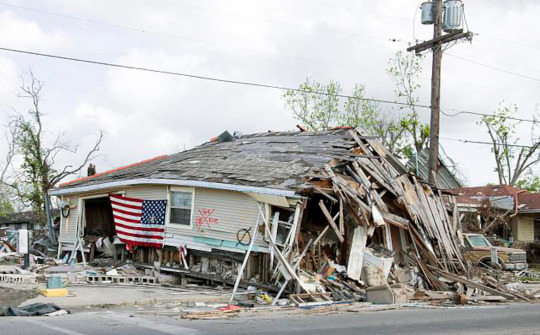
Source: National Guard Bureau, "Examining Lessons from Katrina 10 Years Later"
Then, a massive hurricane struck the Caribbean on August 1, 1772. It was incredibly damaging, causing mass destruction in St. Croix, and this is most definitely one that we in the south would evacuate for. Even my dad would evacuate for this one, and it took a lot of convincing to get him to evacuate for Katrina.
In reaction to this event, Hamilton wrote his famous letter to his father detailing and reflecting on the storm. And finally, I'm giving y'all my analysis of this letter that I keep saying I'll do. However, this post is already incredibly long, so I'm going to do it in a google doc and attach it here.
Source: Alexander Hamilton to The Royal Danish American Gazette, September 6, 1772
The letter was published to The Royal Danish American Gazette, which spread around the afflicted community. Knox's congregation gathered money for the anonymous young author (now not very anonymous) to sail to the American mainland for his education. Originally, Hamilton went to study medicine, due to the high demand for doctors in the Caribbean (his knowledge of anatomy would remain helpful throughout his life). However, at some point he decided he would not be going back to the Caribbean, and switched his focus to law, but we'll discuss that more in part two.
Source: Alexander Hamilton by Ron Chernow, p. 37-40
Well, there's part one. I did all of this in one day because um. I don't know, but it is now one in the morning and i have to wake up earlier than normal. so that's fun. i hope y'all enjoyed. shout out to my mom for proofreading half of this, and shout out to my aunt who gave me coffee, that was a horrible idea. i'll be back with part two at some point, which will probably be more concise because hamilton's childhood in the caribbean is where most of the theories are, so yeah. love y'all.
#alexander hamilton#history#amrev#american history#american revolution#hamilton#18th century#caribbean history#long post#research#heavy breathing#this is my career guys#do it for richie 💪#amrev history#i also watched like half of a chris chan documentary during this#and an entire markiplier playthrough#this is my spring break
46 notes
·
View notes
Text




😊
#blackout#blackgirlmagic#nycstyle#nycfashion#personal#black women#literature#black is beautiful#beauty#flowers#vacaymode#grenada#caribbean history#caribbean girls#st george#shein#selfportiat#self care#self love#vacation#styleinspiration#life style#stylist#style#styleblogger#stylish#pretty#beautiful#beautysupply#beauties
34 notes
·
View notes
Text
Time Travel Question : Medievalish 2
These Questions are the result of suggestions from the previous iteration.
This category may include suggestions made too late to fall into the correct earlier time grouping. Basically, I'd already moved on to human history, but I'd periodically get a pre-homin suggestion, hence the occasional random item waaay out of it's time period, rather than reopen the category.
In some cases a culture lasted a really long time and I grouped them by whether it was likely the later or earlier grouping made the most sense with the information I had. (Invention ofs tend to fall in an earlier grouping if it's still open. Ones that imply height of or just before something tend to get grouped later, but not always. Sometimes I'll split two different things from the same culture into different polls because they involve separate research goals or the like).
Please add new suggestions below if you have them for future consideration. All cultures and time periods welcome.
#Time Travel#Taino#Indigenous History#Tenochtitlan#Irish History#Connacht#Aztecs#Tikal#Maya#Caribbean History#Cuba History#Chimor#History of Textiles#History of the Americas#Rus#History of Religion#Komi#Toltecs#Iberian Peninsula#Bavaria
75 notes
·
View notes
Text
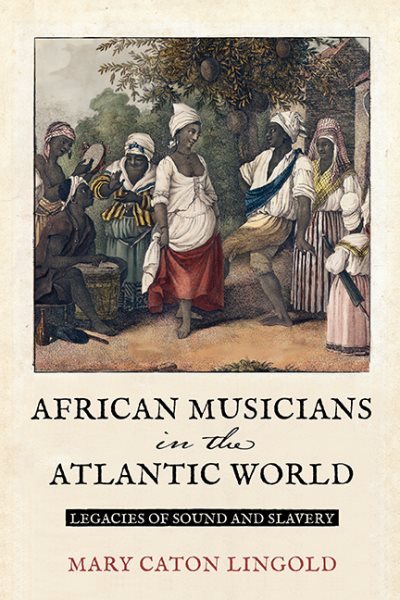
"A rich, well-written and well-researched book on a novel and important topic. African Musicians in the Atlantic World will make a major contribution to multiple fields, including music history, Atlantic studies, colonial Caribbean history and literature, as well as studies of transatlantic slavery, the African diaspora, and Black culture in the Americas. It is full of fascinating archival discoveries and insights."
#uwlibraries#history books#african americans#history of music#caribbean history#colonial history#history of slavery
35 notes
·
View notes
Text
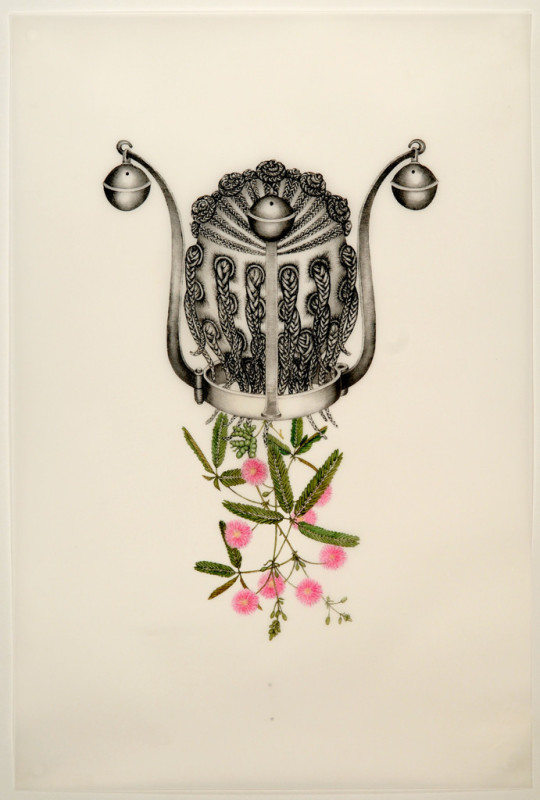


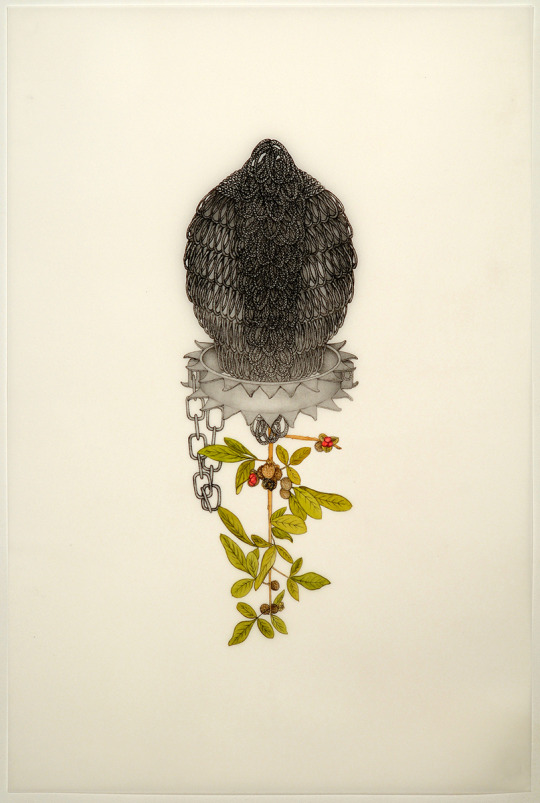

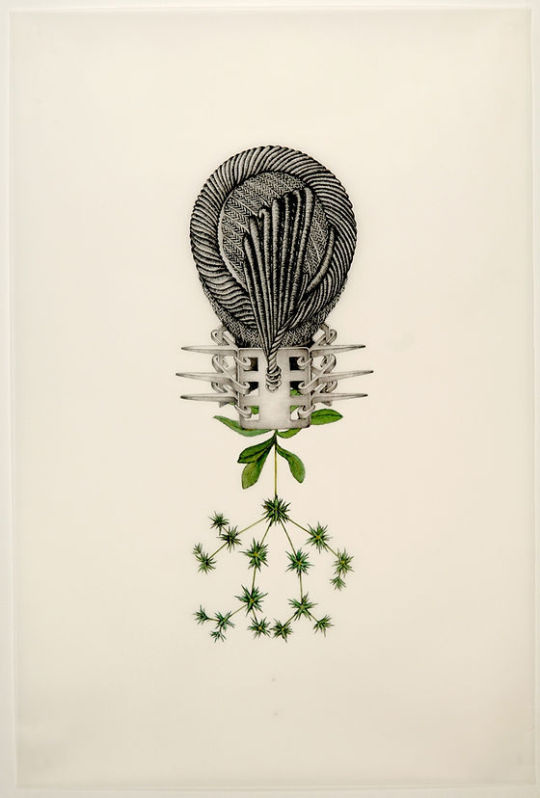
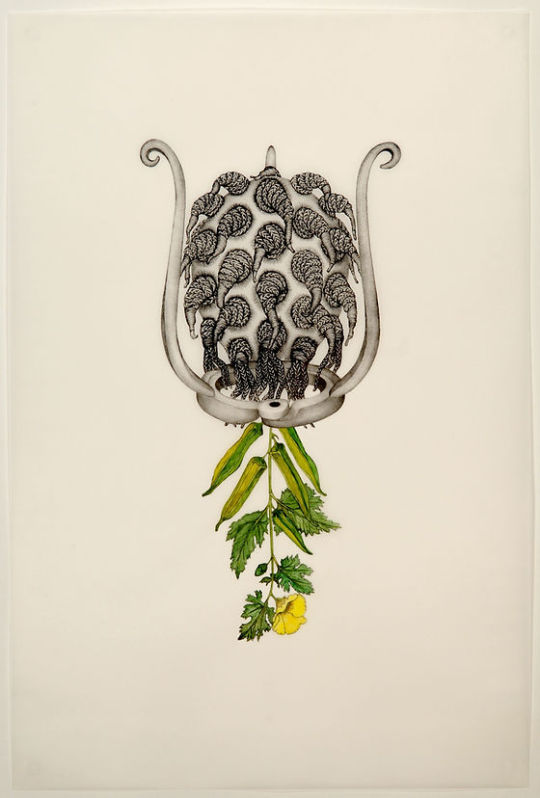

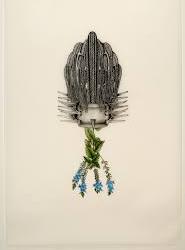
Creole Portraits series by Jocelyn Gardner
Creole Portraits is a collection of hand-coloured lithographic portraits that reveal intricately braided Afro-centric hairstyles entwined within iron slave collars which were used to punish female slaves accused of inducing abortion. Each portrait also displays one of thirteen ‘exotic’ botanical specimens identified as having been used to induce abortion in the 18th century. Delicately hand-painted with watercolours, as was characteristic of natural history engravings of the period, each portrait is named after one of the botanical specimens using the established Linnaeun binominal system of nomenclature of the period in tandem with each slave’s plantation name; an act which parodies the imperial taxonomical systems.
#jocelyn gardner#art#ots#creole portraits#caribbean art#postcolonial art#slavery tw#caribbean history#political art#resistance#black history#black history month#black history matters
77 notes
·
View notes
Text
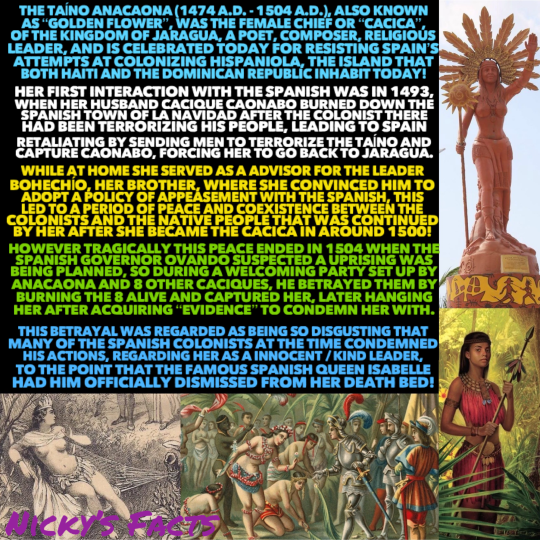
Anaconda remained a advocate for peace to the very bitter end.
🏵️
#history#anacaona#taino#historical figures#hispaniola#native american history#cacica#haiti#dominican republic#womens history#queen#female rulers#royalty#indigenous peoples#jaragua#girl power#caribbean history#female poets#colonization#peacemaker#historical women#royal history#new spain#queencore#1400s#1500s#caribbean sea#nickys facts
12 notes
·
View notes
Text
Read, Explore, Share, Follow, Support
This blog is meant to be a resource for those of you interested in studying Caribbean art from a cross-cultural lens, originally inspired by El Museo del Barrio's exhibition book Caribbean: Art at the Crossroads of the World. As such, tags can be found mainly in English and Spanish and to a lesser extent in French and Dutch. Posts can also be searched by medium, artist, ethnicity or region. Questions, comments, or submissions are always welcome!
❀ Check out what I'm reading - follow me - learn more about me ❀
If you like this blog or enjoy any of my other work please consider signing my virtual guestbook and/or buying me a cup of tea. One of the main things I love about art is being able to open up conversation and dialog about the things that matter. I create work to inspire change and to collaborate, so if this speaks to you I appreciate the support! It may not be the most profitable/capitalistic way of doing things but it is the most healing.
❀ Sign my guestbook here or buy me a cup of tea (mint or ginger) ❀
#caribbean art#arte caribeño#arte latinoamericano#latin American art#West Indian tumblr#caribbean history#latin American history#historia latinoamericana#caribbean literature
19 notes
·
View notes
Text
Me: Oh that's so cool! My language has Caribbean dialects! I wonder how tho
*looks it up*
Slavery by any other name 🥲
#slavery#history#british colonialism#indentured servitude#india#caribbean#hindi#urdu#desi#imperialism#colonization#caribbean hindustani#suriname#trinidad and tobago#guyana#indian diaspora#caribbean history#slave labor#missing history#mauritius#indo caribbean#durban#south africa#forgotten history#fiji
6 notes
·
View notes
Text
For Insight On What Is Taking Place in Haiti:
This is the link to Dr. Bertrhude Albert’s tiktok page:
Dr Bertrhude Albert is a Haitian American whose entire page is filled with the history of Haiti, as well as resources to educate yourself individually. Over the past few months, she’s shared videos of her work back in Ayiti,- the building of a canal, community centers etc.
In the light of what is taking place in Haiti right now, it’s important that you get your information from the perspective of actual Haitians, whether in Ayiti itself, or the diaspora.
6 notes
·
View notes
Text

Dive into Haiti's story of resilience and hope, guided by leadership development with Fritznel D. Octave. Explore the nation's journey and discover solutions for a brighter future. Ready to learn? Order your copy now at https://www.fritzneldoctave.com/order/
#Fritznel D. Octave#Haiti Between Pestilence and Hope#ReadersMagnet#Haiti#Haitian history#Haitian revolution#Haitian culture#Haitian people#Caribbean History
3 notes
·
View notes
Note
RACHEL HAMILTON FACTS
Help I have a wax museum project for school and I’m doing her I cannot find anything about her
OKOKOK This ask is the reason I opened my inbox and discovered all my unanswered asks FSHSJKHFSKH mb. My source for this is Ron Chernow's Alexander Hamilton (because when isn't it) because exactly as you said, there is very little information about Rachel, and Ron walked so the rest of us could run. Here we go
Rachel was one of seven children
Five of Rachel's siblings died in childhood, leaving only our girl and her sister Ann. Ann went on to marry James Lytton after she fled Nevis (where they lived) due to an agricultural plague. Ann Lytton could not take in young Hamilton when he needed it, but she was the only blood relative on Rachel's side that he maintained contact with, and helped her out financially later on.
She was a child of divorce (basically)
Her parents had a very rocky relationship, and this possibly impacted her later relationships with men. Eventually, her parents separated, and she lived with her mother. She seems to have been very close with her mother, as they moved often together, or at least stayed close to one another.
She was previously married, and divorced
Before she met James Hamilton, she was married to man named Johann Lavien. Lavien was really horrible to her and financially and mentally abused her. When she ran away, Lavien sued for divorce, but long story short, Rachel didn't show up for court, and ended up being imprisoned for several years for adultery. The way divorce worked at the time was that a man could win a divorce case with just one accusation of adultery (especially if the woman didn't show up for court) but a woman needed several different, confirmed charges against the man to win. So, it would have been very hard for her to have won in the first place. Also, because of her no-show, she was forbidden from ever remarrying, hence why Hamilton was a bastard.
It is not incorrect to call her Rachel Hamilton and/or Rachel Faucette
While it is probably more respectful to use her maiden name, Faucette, there was a time where she lived as Rachel Hamilton, even though her marriage to James could not have been legally valid. While they lived in Nevis, James and Rachel lived with their two children as a married couple. However, it was when they moved to St. Croix that people recognized her as the former Mrs. Lavien, and tormented her and the boys with their illegitimacy.
She was a very independent woman
If Hamilton inherited anything from his mother, it was his quick thinking and independent mind. Rachel had her own income, and was able to provide for her two sons and tutor them after James left them. She was described by one of Hamilton's sons as "a woman of superior intellect, elevated sentiment, and unusual grace of person and manner. For her he was indebted for his genius." These are all words used to describe Hamilton later in life.
She supported other local women
In teaching her son in his earliest education, she chose a local Jewish woman to do so. Hamilton recalled being taught by her when he was small enough to sit on the table to read next to her. Towards her death, she was tended to by a woman named Ann McDonnell. In a society that was incredibly hostile to women, this was very important.
She died of an unknown illness next to her son, Alexander
She caught a fever in 1768, and was tended to by the aforementioned Ms. McDonnell and a man named Dr. Herring. She was given valerian, and bloodletting was used on Alexander (medicine of the 18th century is a whole other can of worms). Unfortunately, she did not recover, and died at nine o'clock on February 19, 1768.
Those are some of the most important and interesting facts, I believe, about Rachel Faucette. She is really one of my favorite historical figures, and I could talk about her and Maria Reynolds all day. I just love women who overcome the disadvantages they were given in life, I respect them so much. Hope this helps with your project!!!
#i got so excited when I saw this in my inbox#alexander hamilton#rachel faucette#rachel hamilton#history#amrev#asks#american history#amrev history#caribbean history#caribbean#womens history
34 notes
·
View notes
Text
Starting Black History Month in the Diaspora with the Caribbean and the most obvious Caribbean topic:
Specifically the Haitian Revolution. Haiti was and is a country punished for accelerating the course of history by centuries. Prior to that it made a case, along with Barbados and Jamaica (both of which will get separate days to themselves) for the bloodiest industry of them all being nothing less than the sugar industry.
Haiti retook its name as one of the few legacies of the Taino outside of the morality play with Columbus's role in establishing colonialism in the Caribbean. Prior to the revolution, St.-Domingue, as the French named it, was one of the places of greatest wealth and value for the French Empire. It gained that wealth from sugarcane and the brutish policies required to exact harvests with it. The reasons for the revolution and its brutality, which received much greater opprobrium than the French (not that the French didn't get it in their time, the difference is that for all the wrong reasons the bloodshed in France was adored and that in Haiti has never had even a brief period of people adoring it) lie in this long and bloody history and in the specific patterns of sugarcane cultivation.
And, ultimately, in the sugar islands specifically recruiting peoples from Muslim Africa who were already able to read and write and were able to wield this power to devastating effect (which was a big reason their counterparts in the 13 North American colonies deliberately asked for polytheistic peoples, not Muslims).
#lightdancer comments on history#black history month#caribbean history#haitian history#french empire
10 notes
·
View notes
Text
30 notes
·
View notes
Text

"Drawing on a fascinating range of Caribbean texts and case studies, Culinary Colonialism shows how cookbooks have historically been at the heart of projects such as women’s organization, nation building and decolonization in the region. Valens' global focus and her interdisciplinary approach in this book provide new and exciting insights into how more recent Caribbean cookbooks continue to 'migrate and circulate' through the Caribbean diaspora and to intersect with twenty-first century issues such as geopolitics, climate disaster, and new media. Combining recipes and scholarly analysis, this is a book for all those interested in the Caribbean, in Food Studies and in the burgeoning study of the intersections between the two."
13 notes
·
View notes